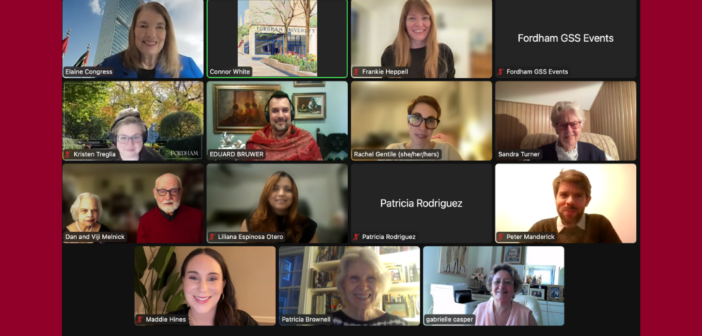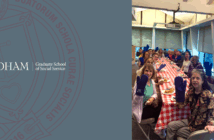In an era dominated by digital advancements, the divide in technology access across the globe is creating what Fordham University Graduate School of Social Service’s Institute for Women and Girls terms a “digital divide.” This growing gap impacts critical aspects of society, from education and health care to our daily work and personal lives. As technological progress hurtles forward, the risk of this gap widening looms large.
This pressing issue took center stage at Fordham’s recent conference on November 17, titled “Closing the Digital Divide.” Organized by Fordham’s Institute for Women and Girls in collaboration with the International Health Awareness Network (IHAN), the event discussed the role of social workers and healthcare professionals in leading the charge against technological disparity.
Decades of Advocacy: Closing the Gap’s Enduring Mission
While the surge of artificial intelligence has recently shaken the tech landscape, the digital divide is far from a new concern. Organizations like Close the Gap have been championing solutions for decades. This not-for-profit institution refurbishes IT devices and distributes them to social and educational projects worldwide. To date, it has served over 50 countries, but its mission doesn’t end with device delivery.
“Providing the devices is one thing, but you need to have the framework around that to make sure that the device is used in a sustainable manner, that there is the local knowledge available to install the devices, and train the next generation of entrepreneurs on how to use the device,” said Peter Manderick, a General Manager at Close the Gap. “Ultimately, they use the power of technology to develop themselves, but also to overcome.”
Manderick said the organization is also committed to environmental impact through initiatives like the WorldLoop program, reducing e-waste and cutting CO2 emissions.
“For every ton of e-waste collected and properly recycled, 1.44 tons of CO2 emissions are avoided,” its website reads.
Telehealth and Beyond: Navigating Technology in Health Care
The impact of the digital divide on health care is evident, especially in countries like Australia. Professor Gabrielle Casper, president of IHAN and head of clinical discipline in obstetrics and gynecology for the University of Notre Dame Australia’s National School of Medicine, discussed telehealth usage in Australia at the conference. Presentations from students at the University of Notre Dame Australia covered various topics, including how rural Australians are handling climate change, the impact of COVID on health care technology, improving access to telehealth tech after the COVID pandemic, and a platform called “My Emergency Doctor,” the “leading Australian provider of emergency telemedicine services. These presentations highlighted the benefits and challenges of integrating technology into health care, particularly for rural Australians.
While technology enhances access, issues of data security, cost, and patient equity persist. These challenges underscore the critical need for a comprehensive and equitable technological infrastructure.
Global Initiatives: From Libraries to Kerala, India
Libraries, often considered the lifeblood of learning environments, play a crucial role in expanding digital access. Maddie Hines, head of digital strategy at Montgomery County Public Libraries, shared initiatives she’s spearheading to provide free wifi, access to online learning platforms, and even virtual high school diploma programs at her libraries.
“This means that a customer who works a challenging schedule can log into our website on their own time and earn their GED, opening up a window of immense opportunity for them,” Hines said.
The global scope of digital literacy challenges was further emphasized with insights from Professor Vijaya Melnick, detailing Kerala, India’s remarkable technological progress. Melnick discussed how the Indian state promoted social and economic equality at the start of the century, positioning itself as one of the most progressive and developed Indian states.
“Currently Kerala has the highest human development index in India, measured in terms of its high literacy rate and school enrollment, its dramatic reductions in fertility, its relatively long life expectancy, and its female to male ratio, which is indicative of the greater gender equity in the region,” Melnick said.
Seeing the potential of information technology twenty years ago, Kerala’s government made significant investments in the infrastructure and promoted a technologically trained and educated citizenry.
“The results of these efforts are impressive,” Melnick said. “For example, while 3 percent of the Indian population lives in Kerala, it has 15 percent of the mobile phone connections in India; men and women have approximately equal access to the internet, email, and personal computers; and both identify as active users of the technology.”
Innovations and Ethical Considerations
As technology evolves, staying informed about digital innovations becomes imperative. Kristen Treglia from Fordham Information Technology highlighted trends in health care tech, from digital visualization to artificial intelligence. However, she stressed the ethical responsibility to create technology with fairness and inclusivity.
“It’s even more apparent and imperative that we act as allies and advocates for the marginalized and disadvantaged so that we have a more equitable society,” she said. “So anything that you can do is good…You can’t solve the whole problem, but you can do your part.”
Eduard Brewer from IHAN introduced the “Women of the Golden Thread” platform, a groundbreaking initiative supporting African women who have experienced gender-based violence. The platform integrates various tools, including a blog and QR-coded clothing for discreet access to emergency helplines.
“Doing research on gender-based violence, we found that the information about the topic was well highlighted in the representative countries, but not in one library, where all the information can be accessed,” Brewer said. “We also found that there are limited ways in which women in Africa that suffer from gender-based violence can communicate and get a link to set up direct help.”
Fordham Master of Social Work student Frankie Heppell concluded the event by addressing the ethical considerations of social work practice in the digital age. She noted that, due to the rapidity of technology’s advancements, the profession’s code of ethics—while a north star in many ways for practitioners—has failed to address these tools adequately.
“Professional competency…is clearly fundamental to the reputation of social work discipline,” Heppell said. “And yet competence with technology has only really evidenced in the more recently updated documents. Only three of the nine codes highlight the importance of developing adequate knowledge and skills before adopting technology in practice.”
Heppell said the digital divide also challenges the essence of social work, demanding a redefined understanding of relationships and client boundaries.
“There is a question of practitioners’ right to privacy, especially in the age of social media, where it’s possible to find information about anyone anywhere, anytime at the click of a button,” she said. “This clearly feeds into the next question, what are the boundaries of professional client relationships?
“Suppose the client sends and sends a crisis-related message late at night. Is it okay to respond right away? Should you respond right away? Can you wait till the morning? How do you address these particular issues?”
Continuing the Conversation
Interested in getting involved with the Women and Girls Insitute? Its next conference is scheduled for March 15, a parallel event with the Committee on the Status of Women at the UN. If you would like to join the Women and Girls Institute or learn more about the next conference, please contact the co-chair of the Women and Girls Institute, Elaine Congress, at congress@fordham.edu
The Institute also plans to publish the next edition of its newsletter in March of 2024. Those interested in authoring an article can send their topic of interest to Liliana Espinosa Otero at lespinosaotero@fordham.edu. Articles should be within 300-600 words.
The importance of closing the digital divide will continue to grow exponentially, and it is conversations like these that help social workers, health care professionals, and all of us to stay informed about how we can help advocate for improved access and digital competency for all.



